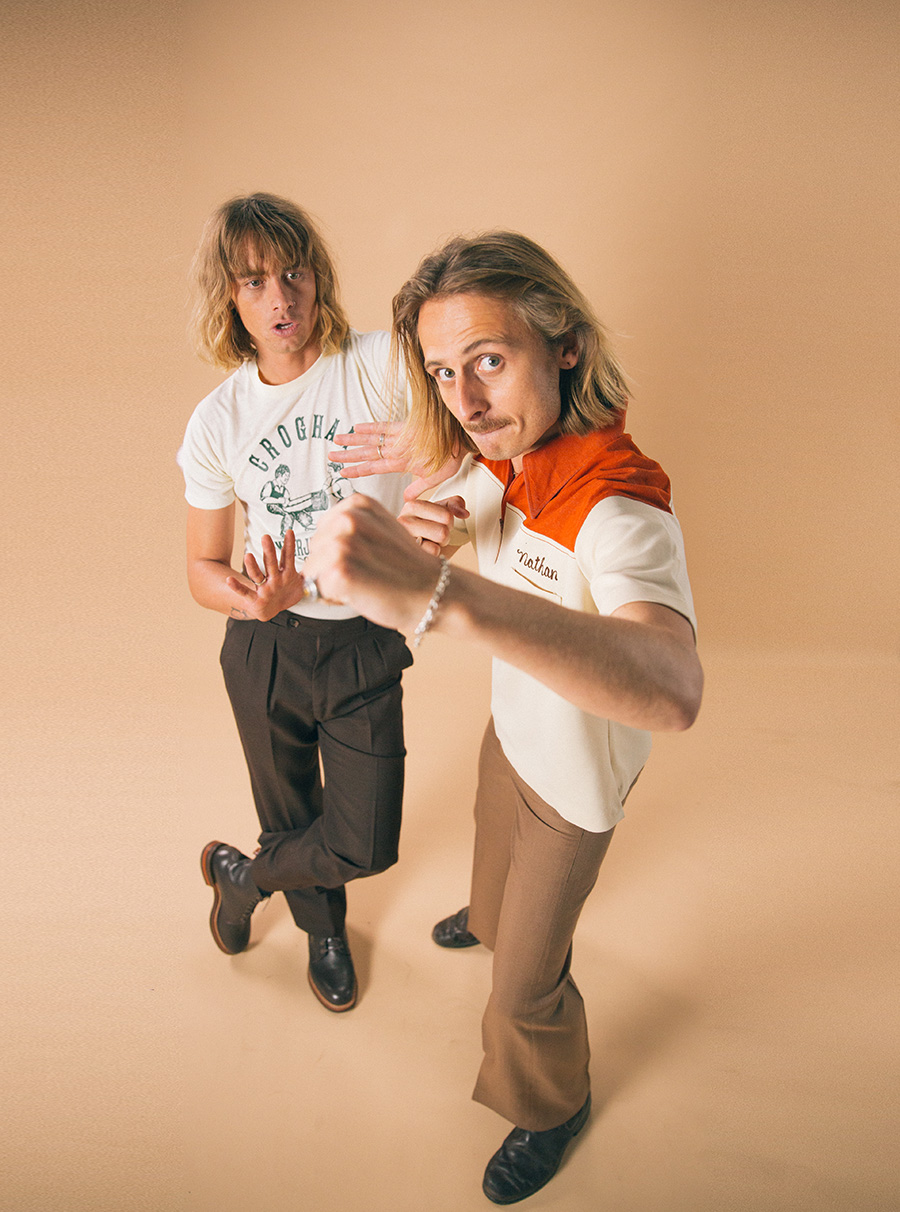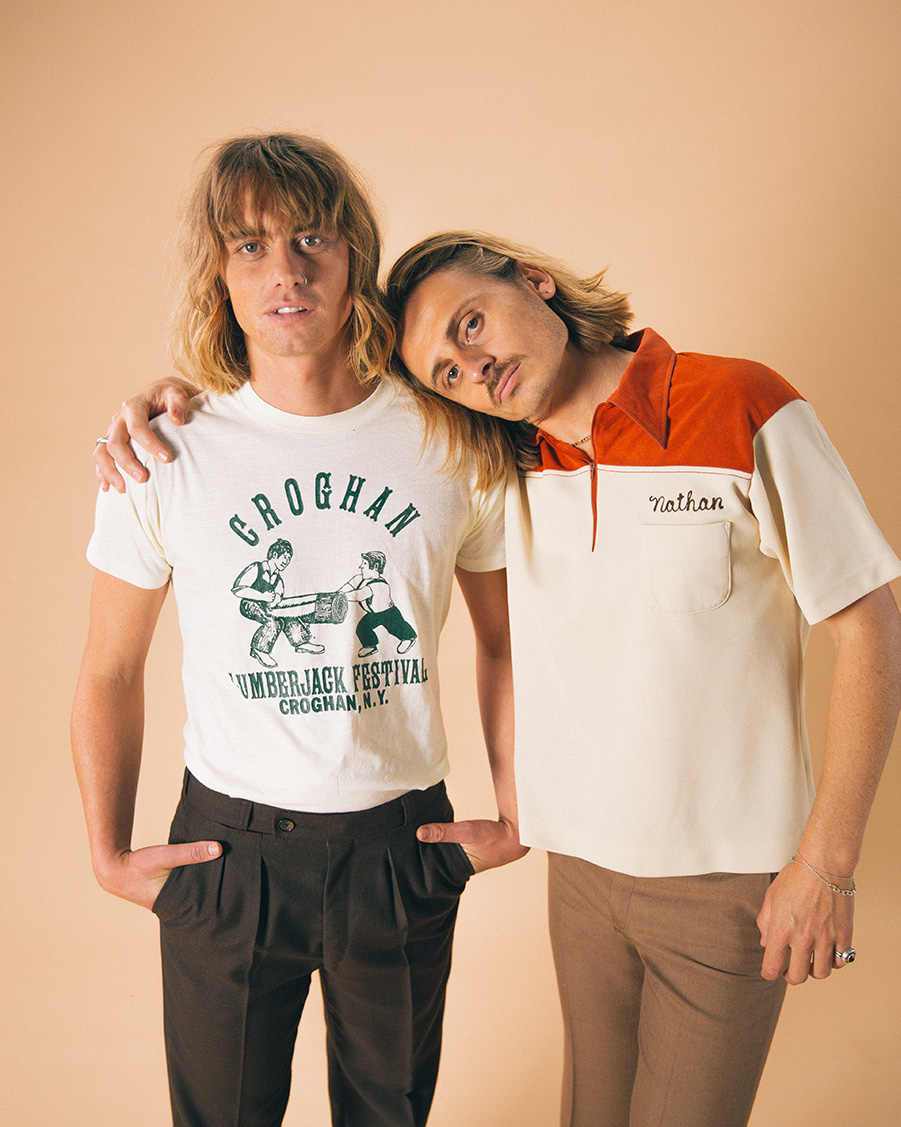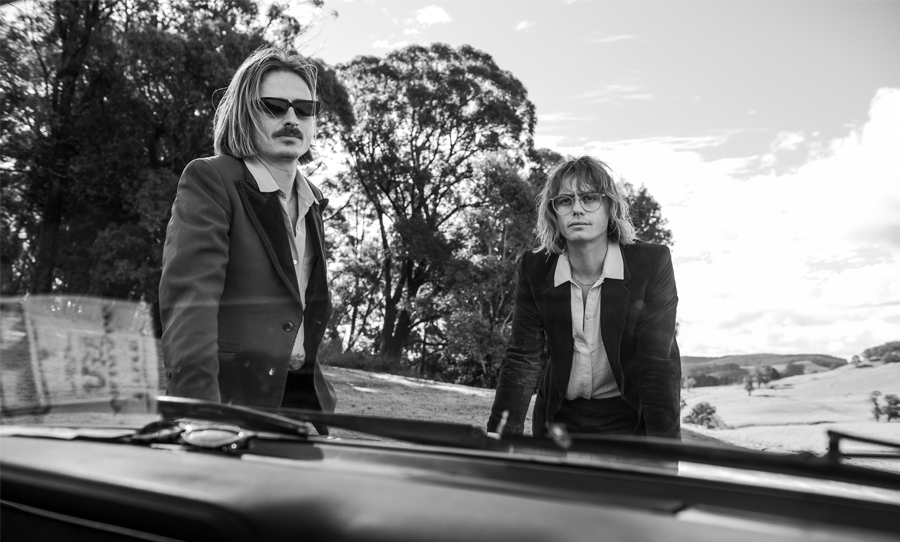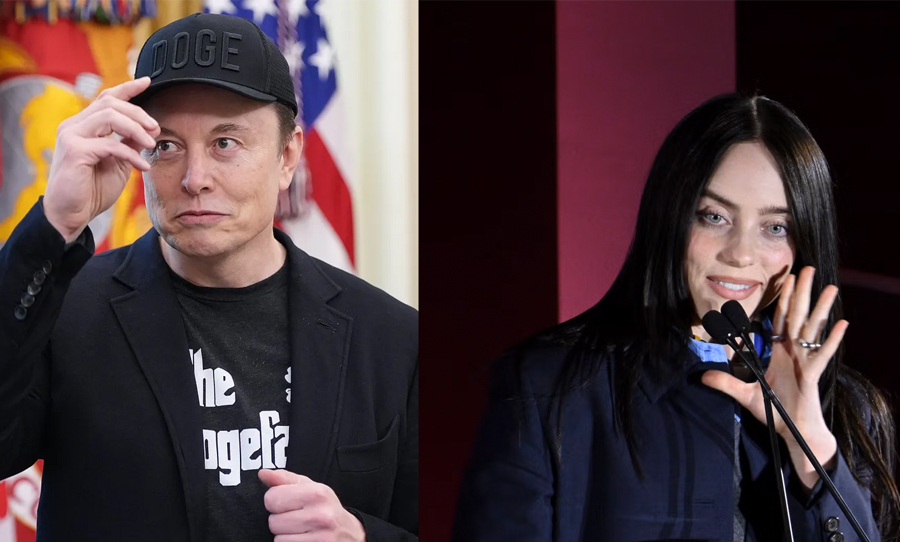You’ve all been wondering how Lime Cordiale spent their 2020, so we sat down with Oli and Louis to break down the steps that lead them to their most ambitious project yet.
When Oli and Louis Leimbach first took to the stage back in 2009, no-one could possibly imagine the phenomenon that Lime Cordiale would become. Looking back over a decade later, a lineage of artistry and global fanbase in tow, there’s no denying that the Leimbach brothers’ report card reads A+ on every line.
Their searing grooves, originally penned to catch the fleeting attentions of RSL patrons, can now ignite our biggest stages. Their reflective creativity has now been pressed into a scintillating soundtrack to our modern world. Lime Cordiale are dominating, and their sophomore album 14 Steps To A Better You is certainly no exception.
Oli and Louis combine the furthest reaches of sonic beauty and then set the pot to simmer, seasoning with a social commentary and introspection. Yet, Lime Cordiale have somehow managed to create their most addictive project yet. The words are more symbolic, the melodies more ambitious, the riffs more luscious, and the message more poignant than ever before.
The album is a guide of clarity, burning from within our world’s many faults. It can serve as a leading hand; allowing tides of distorted brass, silky hooks, and gleaming lyricism to wash you safely to shore. However you listen to Lime Cordiale’s new record, you will be left wrapped in a shepherding twilight – one that has waited 11 whole years to dawn. Welcome to a better you.

HAPPY: Okay, 14 Steps To A Better You: is it the self-help Bible that 2020 needs?
OLI: Hmm, I don’t know if you should necessarily be listening to us… but yeah, it’s a self-help guide because we are quite opinionated throughout this album. Self-help guides are quite opinionated and they’re contradictions of themselves.
LOUIS: It is an album full of our opinions.
HAPPY: Very true, but you guys have always covered personal material in your records. How do you go about keeping concepts fresh and avoiding repetition after 11 years in the game?
OLI: Ooh, I don’t know. That’s an interesting question. It’s like, you just grow and change as a person and different things affect you as you get a little bit older, or experience new things. I don’t think that’s just always things to sing about. I mean, it still feels like sometimes when you’re singing a song about something, you’re the only one in the world that’s ever written about that topic, which is probably not true, but it still can feel fresh in a way. The world is changing so much right now anyway, maybe everyone’s singing about slightly the same things? But I don’t know, I feel that there’s always more material.
LOUIS: I feel like you learn to be more observant as well, whether you like it or not. Constantly walking around and soaking it all in.
HAPPY: When it comes to individual tracks, do you guys have differing opinions on which Lime Cordiale songs were the most empowering for you to write, or which ones you both connected with more?
OLI: Some of the songs we’ve written together from the start, and then other songs we’ve approached separately. So, we definitely would have and maybe we’ve got different favourites. But, we’ve scarily got similar opinions and spend way too much time together.
LOUIS: Why is that scary?
OLI: Our opinions are much too similar.
LOUIS: I don’t agree with that.
OLI: Well, we disagreed right there [laughs].
HAPPY: I’ve heard that the album was recorded on a New South Wales farm, which feels like a major self-help move in itself and ties in great with the record. What was that experience like?
LOUIS: Yeah, it was good. It’s like a family friend’s farm that we’ve been going to since we were little babies, little bubbas.
HAPPY: Naww.
LOUIS: So when you go up there, you feel more relaxed than when we’re at home. I mean, we live with eight people so it gets pretty hectic. There’s a lot of interruptions and lot of distractions, so going out to a farm that has no phone reception and there’s no distractions besides just looking out into a valley or something, it’s pretty easy.
OLI: Yeah. It’s also a place that we’ve spent a lot of holiday time at, and different families have been there together, and we’ve just had a lot of different weird experiences at that place as well growing up. So it’s kind of a good place to be writing about topics, or your life or whatever.
HAPPY: Yeah, it’s like a nice little full circle moment. A lot of what we’ve been hearing about the album is that it’s a bit of a navigation device for people who feel a bit lost. Where did the desire to focus an album around life lessons or mantras come from?
OLI: I think it came halfway through recording it when we sort of realised that there was a theme in the album. I don’t think we ever launched into this with a specific theme, but we just realised that there seemed to be one. Our first album, it just definitely felt like the main message in that was “don’t listen to everyone, don’t listen to the people in there telling you what to do and you can go your own way.” This one, I think it almost pulls it back a little bit and says “yeah, you can do whatever you want. You don’t have to just do the same thing as everyone else. But don’t just be a complete waste of space. Be good and just leave a good impact.” I guess because that’s the one thing that a lot of Australians neglect, I feel. Yeah, we definitely write about Australia more than anywhere.
HAPPY: Totally, well I know that Money has already become a bit of an anthem for some people. Do you ever feel in control of how your audiences are going to react to your work at all?
LOUIS: Ooh, I don’t know.
OLI: Yeah, well we felt nervous releasing Addicted to the Sunshine because I think people don’t really like being told what to think or what to do. So releasing a song that had a bit of an environmental message behind it was slightly nerve wracking, in a way. I don’t know, we’ve released so many songs in the past when we were starting out that we just released and nothing really happened with them. Back then we might have been like “when we released them, we’re gonna be this huge band and everything is going to be so good as soon as we release it. It’s gonna go number one round the world,” or whatever and just be kind of clueless. When reality hits and you go “oh, it’s not really like that,” we kind of got used to that. So we released music now kind of for ourselves, and we just know that it’s part of what we want to do, as well as providing for other people.
HAPPY: You’ve said that on the album you guys were able to “find beautiful sounds and wreck them.” How does this end up playing out in what we hear? Killer quote as well.
LOUIS: Yeah! Well we grew up playing classical instruments; so Oli played the clarinet and I played the trumpet. And then you put that on a record… There’s something, definitely for me anyway, about when you play an instrument like that your whole life, and it’s like a monophonic sound, you sort of get a bit sick of it. Whereas something like synth, or a guitar, or something that can be manipulated in so many ways, it’s not really the same as that. So it’s more on those instruments that we’ve heard so much, and grown up playing that we wanted to wreck. Definitely horns, or a clarinet, or just the whole song really.

OLI: It’s an interesting way of going about it. It’s such a classical sound, something like the clarinet, but it’s not really on that many records that you’re hearing. Whereas a guitar is something that you just hear all the time. We sort of tried to lean towards using stuff like a clarinet and then just distorting the fuck out of it. Or yeah “wrecking it” to sort of get something that is a bit more fresh than just playing a Stratocaster guitar through it. Just, you know, overdrive pedal.
HAPPY: That’s hectic! Linking on from sound to visuals, with 14 Steps we’ve seen even more amazing additions to the Lime Cordiale art collection. Would you guys ever consider branching out into a gallery showing, or something like that, to showcase the originals?
OLI: I mean, we’ve thought about it. We we did it once actually, before one of our shows that we played in Sydney. But it was more like for friends and family. Or maybe no one came up besides our friends and family? I don’t remember… [laughs].
LOUIS: We did do that. We sort of put a show together of single artworks or album artworks.
OLI: Yeah, we need to. I mean, it’s all Louis’ art and it’s so great I reckon. There’s so much art, and there’s so much stuff that doesn’t get used by him as well. We should really be putting on something I think.
HAPPY: Yeah, you’d have stacks of work by now hey?
LOUIS: Drawers full of them.
OLI: I think Louis is bringing out a colouring book soon actually, with a lot of his artworks.
HAPPY: Fuck yeah.
OLI: Uncoloured, meditation colouring.
LOUIS: Colouring in for adults.
https://www.youtube.com/watch?v=cZq5_J4jZxw
HAPPY: That’s going to be sick! With your reputation as touring powerhouses, I can imagine that having a bit of downtime in quarantine would have been a bit of a shake up for you guys. But, you’ve got a whole new gig series all set for next week! Could you tell us a little bit about it?
LOUIS: Yeah, they’re kind of like these New York… I mean, there’s only 80 people that can come to each show, it’s at Oxford Arts Factory in Sydney. Everyone sitting around round tables, dimly lit. I can imagine people smoking cigars or something.
HAPPY: Full jazz bar vibes.
OLI: Yeah, we wanted to do something around the release of the album, it just feels really weird not doing any live shows at all. We just wanted to play some new songs and sort of play with our band, and have an excuse to play. It feels pretty special doing that sort of thing. I love sitting down and watching a show, to be honest. I’m like, if someone’s playing the Opera House so you can have a little wine and a sit down, and just watch the music, and there’s no one in your way. Yeah, that the ultimate for me.
LOUIS: You ol’ boy.
OLI: Ooh yeah.
HAPPY: Completely. Has the quarantine period impacted your outlook on your music in any way?
LOUIS: We’ve been doing a lot of writing. It’s definitely been nice just to be at home. I haven’t been this domestic, or been in this one spot for probably like six years or something.
HAPPY: Yeah, wow.
LOUIS: Yeah. It’s nice to just be a home body. Tend to the garden.
OLI: It’s pretty weird being in this one spot and being healthier than we normally are. But I don’t know, it gives you a bit of perspective, sometimes you do need to slow down just to kind of work out what to do. And like, not playing shows, I don’t know. I was watching some footage of a festival we’re doing over the summer, and I was like, I can’t even imagine playing to that many people. I can’t even imagine that many people in that close proximity.
HAPPY: Yeah, right?
OLI: I think even just these shows to 80 people, I’m gonna be a little bit nervous. It’s gonna feel weird.
HAPPY: Yeah, I bet it’s gonna feel weird playing to a sit down crowd too.
OLI: Yeah. It could go both ways.
LOUIS: It’s definitely scary because, you know, playing to a small crowd you see people’s eyes looking at you, and if someone goes toilet, you’re like “Shit! Someone just left.” But you know, if you’re playing to more of a sea of people, you just don’t even think about it. It just looks like blurry faces. You don’t really concentrate on one single person. We’re gonna have to get the chat going between songs, I reckon.
HAPPY: True, well good luck with it all! Thank you guys so much for the chat.
BOTH: No worries, thanks for having us.
14 Steps To A Better You is out everywhere from July 10th. Pre-save the goods here.



